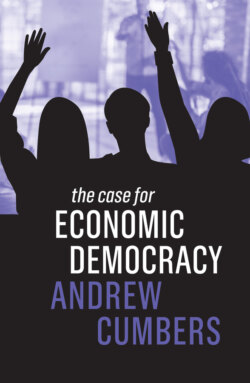Читать книгу The Case for Economic Democracy - Andrew Cumbers - Страница 7
Introduction
ОглавлениеAs we enter the third decade of the twenty-first century, the world is at a crossroads with a number of inter-related economic, ecological and political crises. Economically, there are widening inequalities between rich and poor, and a growing chasm between the elite billionaire class and the rest of us. Linked to this unequal and imbalanced system of global capitalism, we face an environmental catastrophe with global warming brought on by two centuries of rampant industrialization and ill-considered economic growth. Even if we can mitigate its worst effects, the rapid depletion of our natural resources in pursuit of profit threatens to leave the planet barely fit for habitation by future generations. Taken together, these economic and ecological crises are producing a third crisis, the focus of much public debate and angst among media, academic commentators and our ruling classes. This is the crisis of democracy itself.
When most people talk of democracy, they are almost certainly thinking about political democracy with a capital ‘P’: elections, representative government, political parties, the relations between parliament and the public. Very little consideration is given to whether the economy itself should also be thought of in democratic terms. Yet, how the economy functions, who controls it and makes key decisions regarding how it functions, what is produced and who benefits, is fundamental to everything else in our lives. Accessing the economic resources to lead decent lives, doing so in a way that is fair to others, and sustainable in caring for the planet and future generations, should surely be at the core of our discussions about democracy.
This book is motivated by the absence of these issues from public debate. In writing it, I aim to put the question of democratizing the economy back onto the agenda, making the case for economic democracy an important step in dealing with the manifold crises that we face. From the outset we should note that democracy – by any meaningful definition of the term – is absent both from the workplace and the wider economy. In the workplace, workers have diminishing rights over enterprise decision making, trade unions are in retreat and collective bargaining is under attack. There is still a tradition of cooperatives and employee-owned enterprises, nominally committed to democratic practice, though these are marginal to the dominant corporate and privatized economy. More broadly, whether we are talking about the big macroeconomic decisions, such as the setting of interest rates, fiscal decisions about how much tax and spending is required (apart from highly superficial election-time debates), or more fundamental questions over what forms of economic organization, ownership and institutions are required to combat the climate emergency, the broader public has little real say or participation in how the economy functions.
It is my view that the absence of democracy from the economy is a fundamental crisis in itself. A functioning democracy, in a stable and civilized society, is one that respects the rights of individuals, citizens and communities to participate on equal terms in the public and civic realms of that society. Given the central importance of the economy in providing the resources necessary for a society to flourish, the decision making around these resources should be a matter for public engagement and democratic debate.
From this departure point, my intention with this book is to make a renewed case for economic democracy appropriate for our times. To do this, I develop an expansive sense of economic democracy and how this might be applied in the twenty-first century. This involves addressing a set of issues around what concepts, institutions and political agency are required to enable us to move from a capitalist, largely privatized and marketized economy – driven by narrow self-interest and greed – towards a more democratic economy, capable of serving the common good in tackling the ever more prescient social and ecological crises that we face.
